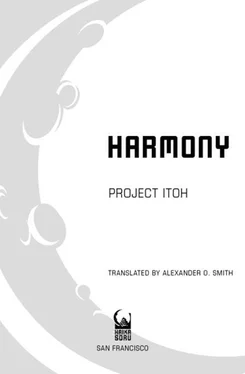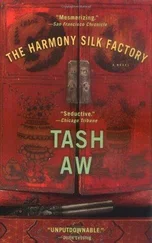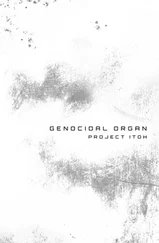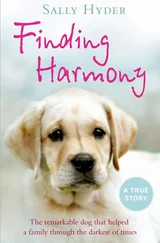Itoh, Project - Harmony
Здесь есть возможность читать онлайн «Itoh, Project - Harmony» весь текст электронной книги совершенно бесплатно (целиком полную версию без сокращений). В некоторых случаях можно слушать аудио, скачать через торрент в формате fb2 и присутствует краткое содержание. Год выпуска: 2010, Издательство: Haikasoru/VIZ Media, Жанр: Старинная литература, на английском языке. Описание произведения, (предисловие) а так же отзывы посетителей доступны на портале библиотеки ЛибКат.
- Название:Harmony
- Автор:
- Издательство:Haikasoru/VIZ Media
- Жанр:
- Год:2010
- ISBN:нет данных
- Рейтинг книги:4.33 / 5. Голосов: 3
-
Избранное:Добавить в избранное
- Отзывы:
-
Ваша оценка:
- 80
- 1
- 2
- 3
- 4
- 5
Harmony: краткое содержание, описание и аннотация
Предлагаем к чтению аннотацию, описание, краткое содержание или предисловие (зависит от того, что написал сам автор книги «Harmony»). Если вы не нашли необходимую информацию о книге — напишите в комментариях, мы постараемся отыскать её.
Harmony — читать онлайн бесплатно полную книгу (весь текст) целиком
Ниже представлен текст книги, разбитый по страницам. Система сохранения места последней прочитанной страницы, позволяет с удобством читать онлайн бесплатно книгу «Harmony», без необходимости каждый раз заново искать на чём Вы остановились. Поставьте закладку, и сможете в любой момент перейти на страницу, на которой закончили чтение.
Интервал:
Закладка:
“Actually, I did know that one.” I chuckled. Miach Mihie, banzai!
“Under Nazi rule, the ‘crippled’ became the ‘physically impaired.’ Lunatic asylums became psychiatric hospitals. Countless words pertaining to the human body changed in subtle ways.”
“What’s lunatic mean?”
“Think of it as a not-very-nice way to refer to someone in serious need of high-level counseling and deep therapy. The Nazis also spearheaded the first nationwide attempt to stamp out smoking because of its detrimental effects on health. In 1939, the Nazi government established a regulatory agency for alcohol and tobacco products. In 1941, a research laboratory to study the harmful effects of tobacco was established at the Universität Wien under the auspices of Hitler himself.”
“You make it sound like the Nazis were a bunch of dogooders.”
With these cherry-picked examples, Nazi society didn’t sound all that different from ours. Which meant that now I had a personal reason to hate the Nazis as the forebears of the assholes who wouldn’t let me smoke today.
“In a sense, that’s true. Even if they were responsible for the greatest genocide of the twentieth century. There are many sides to everything, that’s the point. Take a clean freak and turn them up a few notches, whammo, they’re talking about racial purity.‘Tobacco is the source of all ills, a danger to the nation’s citizens.’That’s a protoform of what we call resource awareness today.”
I shrugged. “So we’ve just reinvented Nazi Germany on a global scale then. Great.”
“In a sense, yes, we have. Though there are significant differences. Foremost among them is that, in the time of the Nazis, it was the Nazi party and a few scientists who were pushing eugenics as a way to clean things up. In admedistrative society, everyone’s out there together, waving the same flag. We are all health freaks. The Nazis might have had the idea long before us, but not even they could keep their own soldiers on the front lines from smoking—especially in the harsher places like the Eastern Front.”
“Oh, I understand that. I really understand that.” I chuckled. Of course, for me it worked the other way around. It wasn’t battlefield conditions that made me smoke. It was the smokes that lured me out to the battlefield. I wondered for the first time what had become of Étienne and the others who used to partake in our contraband exchanges. For a moment, I was transported back to the sunflower fields and blue skies of the Sahara, dotted with the indigo veils of the Kel Tamasheq.
“But now tobacco’s gone from the world. Save for a few holdouts in Africa and parts of Asia—conflict zones, mostly. Go to any admedistration and you’ll not find a single constituent partaking of either cigarettes or alcohol. The same goes without saying for harder drugs. Do you know why drugs were prohibited in the first place, way back when?”
“Enlighten me.”
“It started back during the settlement of North America. The slaves and laborers brought in from Africa and China had a custom of chewing on coca leaves, which enabled them to work far beyond the usual limits of their physical bodies. Of course, this didn’t amuse the white laborers who weren’t partaking. By abolishing drugs for moral reasons, they attempted to wrest the title of top laborers from so-called inferior races.”
“That’s funny. I always thought it was because drugs ruined people’s lives.”
“Well, that’s true too, but that’s only one aspect of the truth.” The professor leaned back in his chair. “Of course, my generation is blessed and cursed with having seen the reasons why our current health-obsessed society needs to be what it is. And I’m sure you had to sit through your share of lessons on the Maelstrom when you were in school, Tuan.”
The section of history class dealing with the Maelstrom was a curriculum heavyweight. Thinking back on it, it occurred to me that history had always been Miach’s favorite subject—the only one she was truly passionate about—and the Maelstrom was her favorite part of that.
I had never been much interested in history class, even though we were always happy to receive Miach’s gleanings of wisdom from the same.
Hey, Tuan, you know what?
A whole ten million people died during just a few years in North America… “
That’s mostly because the people writing your textbooks were just the right age to remember the Maelstrom with fear,”Professor Saeki went on. “There were riots all over America—the strongest and wealthiest nation in the world at the time—that touched every corner of the land. A lot of racial cleansing too. Hispanics, Koreans, Africans—everyone was a target. The killing was so frenzied you would think everyone in the country had been born with an organ specifically designed for massacring people who didn’t look like them. So ethnicity killed ethnicity, and the chaos spread to other countries, until the terrorists decided to start lobbing the nukes they’d stolen, and everything went to hell. Our current benevolent society is a reaction to that. Some people might find the air a bit stifling, but it’s a sight better than falling into chaos like the Maelstrom again. After all, no one wants to see themselves and their children die, and what we have now is far preferable to the past, when a few men in smoke-filled rooms had all the power.”
“I’m glad we’ve learned how to tame each other, then. It’s like we’re all one another’s pets, isn’t it.”
“Always a cynic. Look, when people experience something really extreme, it’s very difficult for them to find balance after that. Their reaction usually points in an equally extreme opposite direction. That’s how we got our lifeist society. I agree, we’ve gone overboard for sure. It’s a bit silly to keep a piggy bank around when your wallet’s always full—but you wouldn’t know what a piggy bank is, would you, Tuan?”
I tried to keep from laughing out loud and only mostly succeeded.
The professor raised an eyebrow at me. “Something funny?”
“No, I was just remembering having heard a friend use that expression a long time ago.”
“You don’t say.” The professor shrugged. “Whatever, I’m sure you didn’t come here to learn about antiquated idiomatic expressions. What do you want to know, Tuan? When a WHO agent comes calling, it’s usually something important.”
“Miach Mihie.”
It was quick, but I didn’t miss the look of alarm that passed across Professor Saeki’s eyes. He put one hand to his mouth and looked thoughtful. “Hmm, yes. I received her body on Nuada’s behalf.”
“Where is my father?”
“A good question. Neither of us have tried contacting each other for quite some time.”
I decided I would press the attack. “My father took Miach along with him to Baghdad, didn’t he?”
The professor waved his hand as if to suggest this was not a fruitful line of questioning. The old man’s guard was up, I could tell.
“Where is my father? Is he not in Baghdad?”
The professor shook his head and sighed. “If he’s not in Baghdad, then your guess is as good as mine. Why not ask the global FindYou?”
“I did. Apparently, he’s no longer on the planet.”
He cocked his head. “What do you suppose that means?”
“I didn’t get a single hit from a search. Nor is he on any of the death records of any admedistration. He might’ve turned off the location signal on his WatchMe, but even then I’d still get a hit—I just wouldn’t know where he was.”
I stared at the professor, wondering how many of his defenses I would have to patiently dismantle, how many moats I would have to fill to get to the truth. No wonder Miach’s mother gave me his contact information, for all the good it was doing me.
Читать дальшеИнтервал:
Закладка:
Похожие книги на «Harmony»
Представляем Вашему вниманию похожие книги на «Harmony» списком для выбора. Мы отобрали схожую по названию и смыслу литературу в надежде предоставить читателям больше вариантов отыскать новые, интересные, ещё непрочитанные произведения.
Обсуждение, отзывы о книге «Harmony» и просто собственные мнения читателей. Оставьте ваши комментарии, напишите, что Вы думаете о произведении, его смысле или главных героях. Укажите что конкретно понравилось, а что нет, и почему Вы так считаете.












